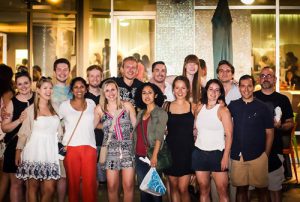
June 29, 2017, by studentcontributor
Together We Will Overcome Addiction – My week at the Betty Ford Centre
I have had an interest in the Disease of Addiction since a placement on the Liver Ward at the Royal Derby Hospital during my first clinical placement at medical school. I found working with the certain alcoholic demographic — typically low socio-economic status, disenfranchised and at the edge of society — extremely rewarding. Typically they were complex patients with a variety of co-morbidities, often accompanied with mental health issues and harrowing backgrounds. As I researched more about alcoholism I learnt that it actually reached all corners of society, no longer a disease of the poor and ‘down and out’ but could affect the high-functioning members of society as much as the unemployed and abused. A further placement on a drug and alcohol rehabilitation centre in Nottingham furthered my interest.
Summer Institute for Medical Students (SIMS)
I knew that for my elective I wanted to learn more about addiction and the people that it could effect. The name “Betty Ford’ to me was synonymous with recovery from chemical dependency and was the world renowned centre for treating the disease of addiction. A simple Google search alerted me to the Summer Institute for Medical Students (SIMS) programme, a fully funded scholarship to attend a week long immersive programme at the Betty Ford Centre (BFC) in Rancho Mirage in California.
Application process
The application process was relatively straight forward. It required two letters of recommendation supporting your application as well as a short essay on your personal or professional experience with addiction. I was thrilled to be awarded a place and in mid-June I flew from Manchester to Los Angeles, eventually arriving in Palm Springs 15 hours later to a balmy 49 degree heat. The SIMS programme is fully funded by donors to the Hazelden Betty Ford Foundation and on our first day I met with the other 14 medical students, 13 from other universities throughout the US and one from Canada, all at various stages of their medical school careers.
Treatment
The BFC adopts a 12-step philosophy of Alcoholics Anonymous and assumes an abstinence approach. This is quite a traditional treatment model but the BFC believes wholeheartedly the 12-step model works. The abstinence approach particularly applies to drug recovery – currently no medication, such as methadone or buprenorphine, is used to control cravings. Instead the BFC believes that abstinence from all drugs results in a more successful recovery in the long term.
Following detoxification, patients undergo treatment and relapse prevention involving a fully holistic approach covering a range of behavioural treatments. These include CBT, meditation, anger management and AA or Narcotics Anonymous meetings as appropriate, all individualised for each patient. We were given the opportunity to sit in with small group therapy sessions during our week on the programme. This gave us the chance to interact on a more personal level with the patients and begin to understand their backgrounds as well as their continual struggle with cravings.
We also attended daily lectures on a variety of subjects including courage, how medical professionals are taught to understand addiction and family therapy. We learnt about the idea of the ‘Disease of Addiction’ and how it is in fact a disease of the mid-brain resulting in a defective decision making process – essentially making addiction a disease of choice. Addicts may be able to modify their behaviour but cannot change their physiological response to the drug (i.e. the craving). At times their cravings may become overwhelming, hence why the addict may relapse. Through therapy it is believed that the brain can be re-wired to help diminish these cravings.
Demographics
What struck me most about the BFC was the obvious demographic of the patients that attended the facility. These people did not look like the addicts I was used to seeing in Nottingham or Derby. They appeared too healthy – they did not appear malnourished, had no visible signs of liver disease and had a full set of sparkling white teeth despite often heavy addictions to large quantities of crystal meth and heroin. They were predominantly white and appeared relatively affluent. However we were informed that the patient population has changed vastly over the past few years. Once a celebrity haunt where Steven Tyler, Lindsey Lohan and Sir Anthony Hopkins could be seen walking the halls, previous residents had to self-fund the $2400 a day treatment plan. Now, 85% of residents are funded by insurance. This results in a more representative population but as insurance is provided by those in employment, it results in the poorest addicts not being reached. Due to government regulations the BFC are unable to take any Medicare patients who must attend the drastically underfunded public programmes instead. In addition the BFC was unable to take addicts with primary co-existing mental health issues or those that did not want to undergo treatment. This resulted in a patient group who were motivated, educated and willing to change. It would be interesting to see if their programme, heavily structured around group therapy and lectures, would work for those less-educated, lower classed individuals.
Patient stories
Being able to hear first-hand peoples stories that were at various stages of their recovery – from day one to people who had been clean for decades, was a great privilege. The week was very emotive and I do not think I was fully prepared for how life changing it could be for both the patients and myself. The stories of the people I will never forget, from the banker who narrowly missed out on 9/11 and resulted in spending the remaining noughties in a cocaine fuelled haze, the college professor who used to drink Listerine if he couldn’t get served alcohol, the meth addicted teacher with HIV, the 60-year-old alcoholic housewife, the broadcast journalist self-confessed party girl, the airline pilot who believed if he still could get up for work he did not have a problem and the pharmacist getting high off her own supply, every story was so different.
A fantastic opportunity
The SIMS programme is a fantastic opportunity to see inside the leading chemical dependency treatment and recovery centre in the world. It really helped me understand more about addiction, how to discuss addiction with my patients and how to support and treat addiction in the future. One in 10 people are said to suffer from some form of addiction and yet our understanding of the disease and how to manage it is limited at best. Addiction carries with it a great social stigma that you wouldn’t get from diseases such as diabetes or cancer. I feel that now I have attended the SIMS programme I will be better able to deal with addicted patients throughout my medical career. For a truly immersive, life-changing experience in the field of addiction I cannot recommend the SIMS programme enough.

More information about the SIMS programme and how to apply can be found here:
http://www.hazeldenbettyford.org/education/medical-professional-education/summer-institute-medical-students
Final-year medical student, Rebecca Bennett, was awarded a scholarship by the Hazelden Betty Ford Foundation to spend a week in June at the Betty Ford Clinic in California, USA, learning about substance misuse. The award covered all travel and accommodation costs of the placement.
No comments yet, fill out a comment to be the first

Leave a Reply